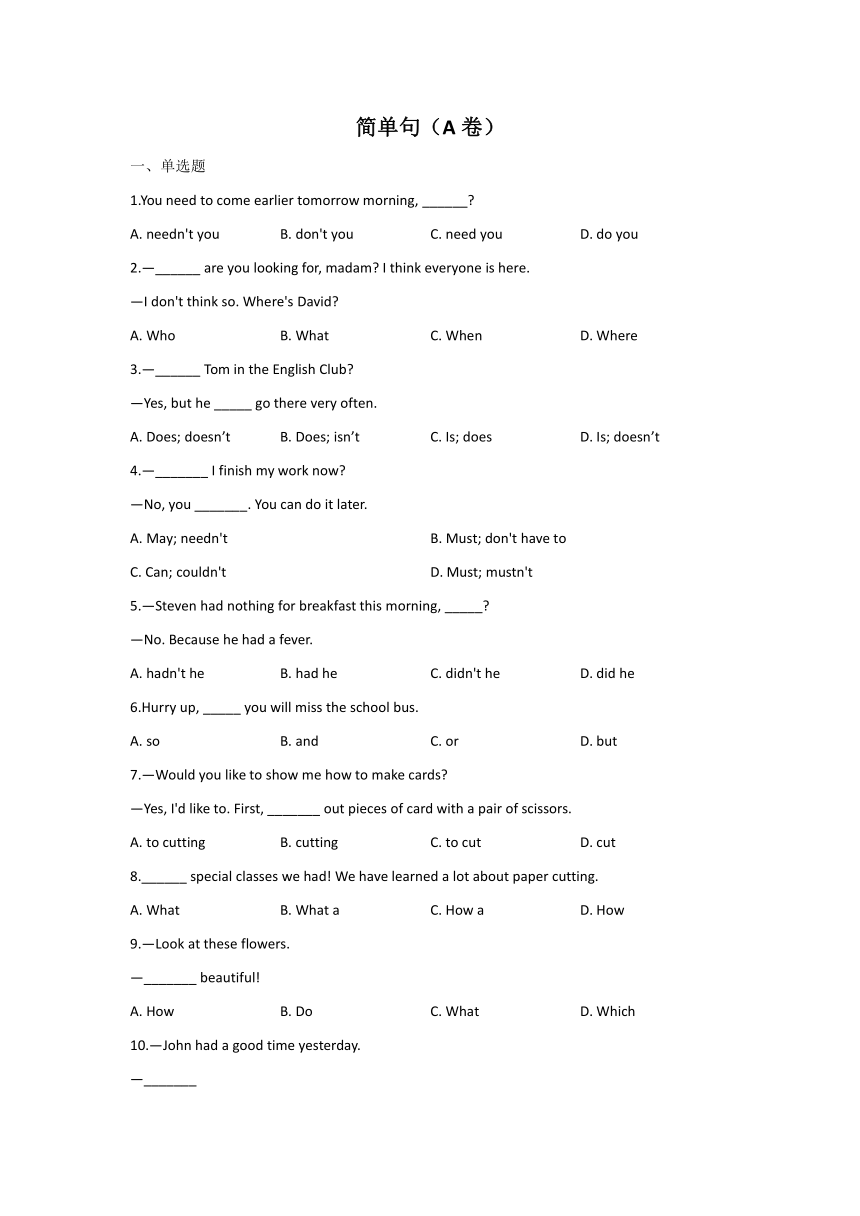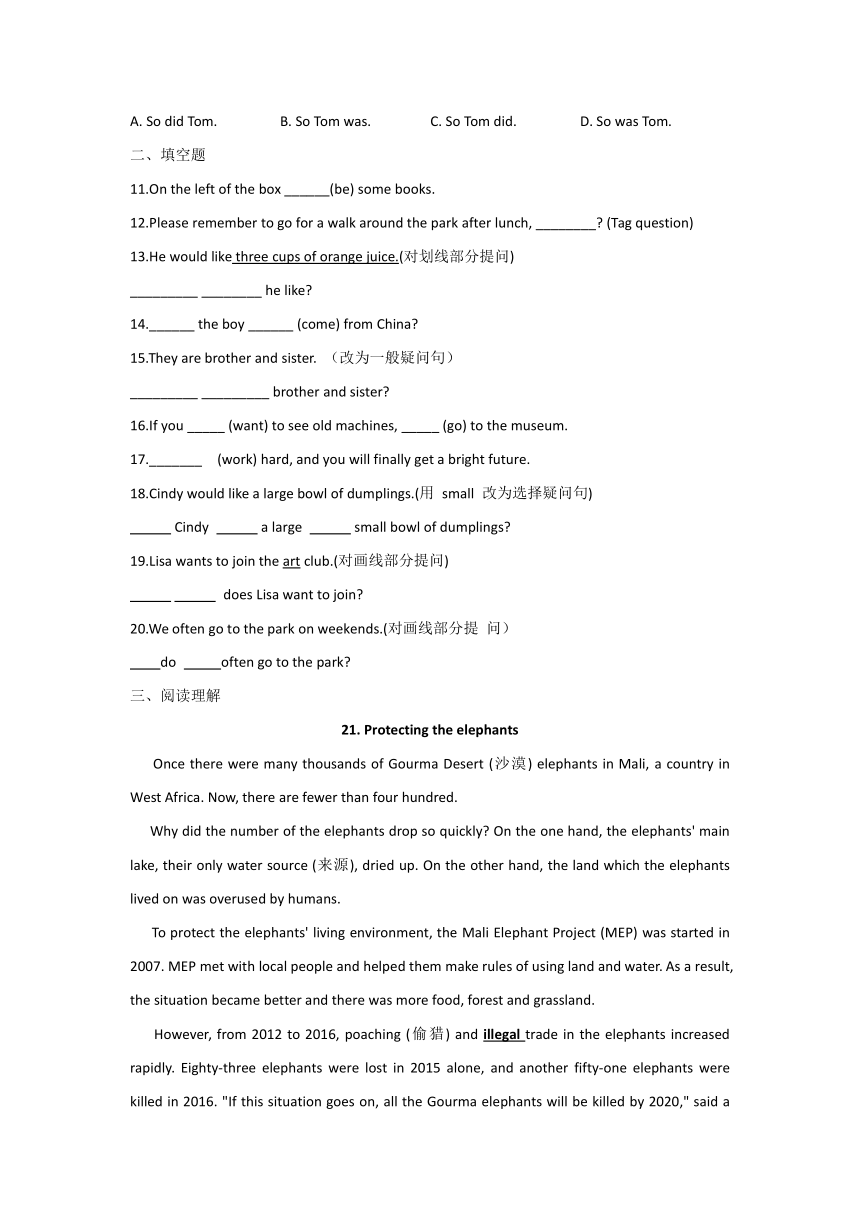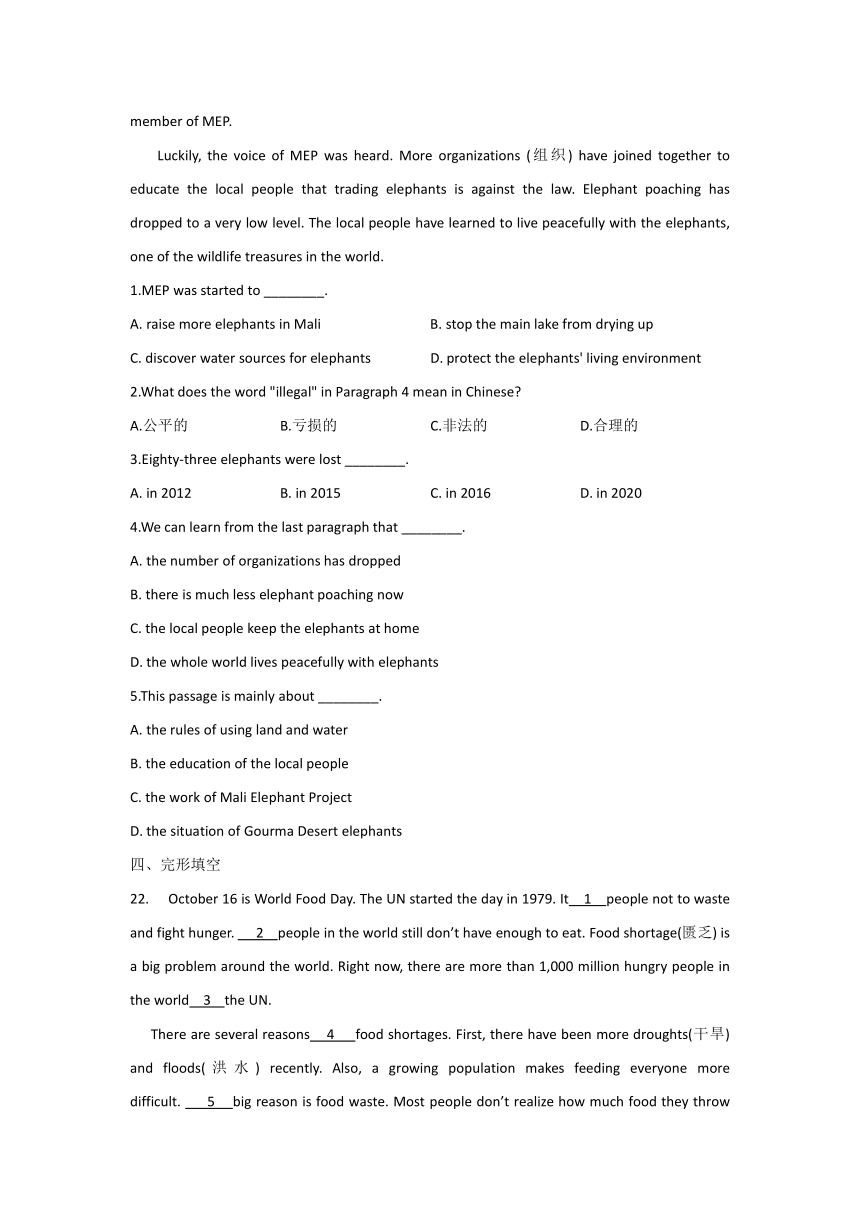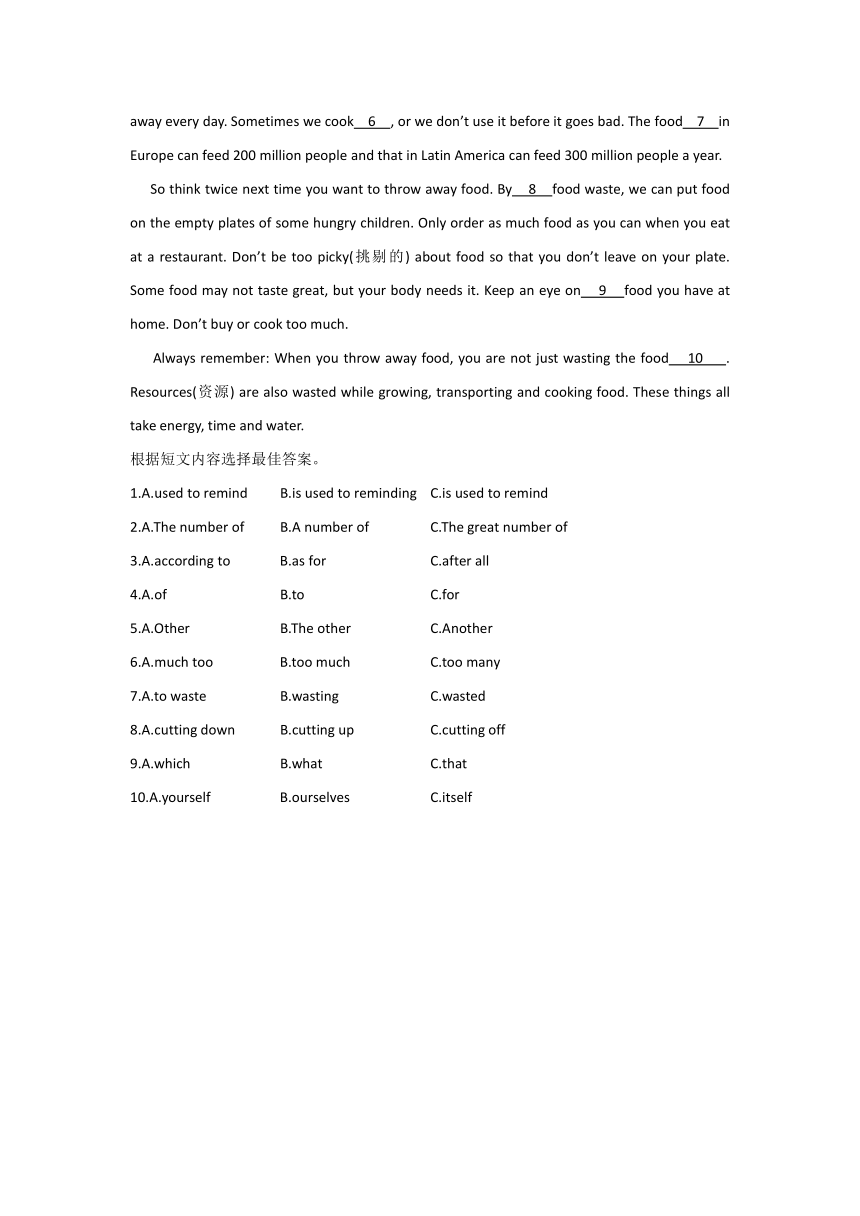2022年中考英语句型专项练习 简单句(A卷)(含答案)
文档属性
| 名称 | 2022年中考英语句型专项练习 简单句(A卷)(含答案) |

|
|
| 格式 | doc | ||
| 文件大小 | 21.3KB | ||
| 资源类型 | 教案 | ||
| 版本资源 | 通用版 | ||
| 科目 | 英语 | ||
| 更新时间 | 2022-01-09 00:00:00 | ||
图片预览




文档简介
简单句(A卷)
一、单选题
1.You need to come earlier tomorrow morning, ______
A. needn't you B. don't you C. need you D. do you
2.—______ are you looking for, madam I think everyone is here.
—I don't think so. Where's David
A. Who B. What C. When D. Where
3.—______ Tom in the English Club
—Yes, but he _____ go there very often.
A. Does; doesn’t B. Does; isn’t C. Is; does D. Is; doesn’t
4.—_______ I finish my work now
—No, you _______. You can do it later.
A. May; needn't B. Must; don't have to
C. Can; couldn't D. Must; mustn't
5.—Steven had nothing for breakfast this morning, _____
—No. Because he had a fever.
A. hadn't he B. had he C. didn't he D. did he
6.Hurry up, _____ you will miss the school bus.
A. so B. and C. or D. but
7.—Would you like to show me how to make cards
—Yes, I'd like to. First, _______ out pieces of card with a pair of scissors.
A. to cutting B. cutting C. to cut D. cut
8.______ special classes we had! We have learned a lot about paper cutting.
A. What B. What a C. How a D. How
9.—Look at these flowers.
—_______ beautiful!
A. How B. Do C. What D. Which
10.—John had a good time yesterday.
—_______
A. So did Tom. B. So Tom was. C. So Tom did. D. So was Tom.
二、填空题
11.On the left of the box ______(be) some books.
12.Please remember to go for a walk around the park after lunch, ________ (Tag question)
13.He would like three cups of orange juice.(对划线部分提问)
_________ ________ he like
14.______ the boy ______ (come) from China
15.They are brother and sister. (改为一般疑问句)
_________ _________ brother and sister
16.If you _____ (want) to see old machines, _____ (go) to the museum.
17._______ (work) hard, and you will finally get a bright future.
18.Cindy would like a large bowl of dumplings.(用 small 改为选择疑问句)
Cindy a large small bowl of dumplings
19.Lisa wants to join the art club.(对画线部分提问)
does Lisa want to join
20.We often go to the park on weekends.(对画线部分提 问)
do often go to the park
三、阅读理解
21. Protecting the elephants
Once there were many thousands of Gourma Desert (沙漠) elephants in Mali, a country in West Africa. Now, there are fewer than four hundred.
Why did the number of the elephants drop so quickly On the one hand, the elephants' main lake, their only water source (来源), dried up. On the other hand, the land which the elephants lived on was overused by humans.
To protect the elephants' living environment, the Mali Elephant Project (MEP) was started in 2007. MEP met with local people and helped them make rules of using land and water. As a result, the situation became better and there was more food, forest and grassland.
However, from 2012 to 2016, poaching (偷猎) and illegal trade in the elephants increased rapidly. Eighty-three elephants were lost in 2015 alone, and another fifty-one elephants were killed in 2016. "If this situation goes on, all the Gourma elephants will be killed by 2020," said a member of MEP.
Luckily, the voice of MEP was heard. More organizations (组织) have joined together to educate the local people that trading elephants is against the law. Elephant poaching has dropped to a very low level. The local people have learned to live peacefully with the elephants, one of the wildlife treasures in the world.
1.MEP was started to ________.
A. raise more elephants in Mali B. stop the main lake from drying up
C. discover water sources for elephants D. protect the elephants' living environment
2.What does the word "illegal" in Paragraph 4 mean in Chinese
A.公平的 B.亏损的 C.非法的 D.合理的
3.Eighty-three elephants were lost ________.
A. in 2012 B. in 2015 C. in 2016 D. in 2020
4.We can learn from the last paragraph that ________.
A. the number of organizations has dropped
B. there is much less elephant poaching now
C. the local people keep the elephants at home
D. the whole world lives peacefully with elephants
5.This passage is mainly about ________.
A. the rules of using land and water
B. the education of the local people
C. the work of Mali Elephant Project
D. the situation of Gourma Desert elephants
四、完形填空
22. October 16 is World Food Day. The UN started the day in 1979. It 1 people not to waste and fight hunger. 2 people in the world still don’t have enough to eat. Food shortage(匮乏) is a big problem around the world. Right now, there are more than 1,000 million hungry people in the world 3 the UN.
There are several reasons 4 food shortages. First, there have been more droughts(干旱) and floods(洪水) recently. Also, a growing population makes feeding everyone more difficult. 5 big reason is food waste. Most people don’t realize how much food they throw away every day. Sometimes we cook 6 , or we don’t use it before it goes bad. The food 7 in Europe can feed 200 million people and that in Latin America can feed 300 million people a year.
So think twice next time you want to throw away food. By 8 food waste, we can put food on the empty plates of some hungry children. Only order as much food as you can when you eat at a restaurant. Don’t be too picky(挑剔的) about food so that you don’t leave on your plate. Some food may not taste great, but your body needs it. Keep an eye on 9 food you have at home. Don’t buy or cook too much.
Always remember: When you throw away food, you are not just wasting the food 10 . Resources(资源) are also wasted while growing, transporting and cooking food. These things all take energy, time and water.
根据短文内容选择最佳答案。
1.A.used to remind B.is used to reminding C.is used to remind
2.A.The number of B.A number of C.The great number of
3.A.according to B.as for C.after all
4.A.of B.to C.for
5.A.Other B.The other C.Another
6.A.much too B.too much C.too many
7.A.to waste B.wasting C.wasted
8.A.cutting down B.cutting up C.cutting off
9.A.which B.what C.that
10.A.yourself B.ourselves C.itself
答案以及解析
一、单选题
1.答案:B
解析:need既可用作情态动词,又可用作实义动词。用作情态动词只用于疑问句和否定句,后接动词原形;用作实义动词可用于各种句子,后接名词或不定式作宾语,不定式要带to。本题中的need是实义动词,故反义疑问句要加助动词。
2.答案:A
解析:考查特殊疑问词的用法。句意:—您在找谁,女士?我想每个人都在呢。—我不这样认为。大卫在哪里?根据下句"Where's David"可知,上句问的是在找谁。所以使用who。故选A。
3.答案:D
4.答案:B
解析:考查情态动词。句意:—我必须现在完成工作吗?—不需要。你可以稍后再做。在回答以must开头的一般疑问句时,肯定回答用must,否定回答用needn't或don't have to。故选B。
5.答案:D
解析:考查反意疑问句。—史蒂夫今天早上没吃早饭, 对吗?—是的, 因为他发烧了。反意疑问句的构成规则是: 前肯定, 后否定或者前否定, 后肯定。前句中nothing表示否定, 所以后面的疑问部分用肯定形式, 根据had可知句子的时态为一般过去时, 后面用助动词did。故选D。
6.答案:C
解析:前后两部分语意为:快点;你会错过校车的。应用or“否则”。故选C。
7.答案:D
8.答案:A
解析:考查感叹句的用法。句意:我们上的课程多么特别啊!我们学到了很多关于剪纸的知识。分析句子结构可知,本句是感叹句。被感叹的中心词 classes是名词,应该用what来引导感叹词。又因为classes是复数形式,故选A。
9.答案:A
10.答案:A
解析:本题是倒装句,用一般过去时did。故选A。
二、填空题
11.答案:are
解析:一些书在这个箱子的左边。该句是倒装句,主语是books,复数,所以用系动词are。故填are。
12.答案:will you/won't you
13.答案:What would
14.答案:Does;come
解析:考查疑问句。因为主语是第三人称,所以用does来提问。
15.答案:Are;they
解析:句意:他们是哥哥和妹妹(弟弟和姐姐)。本句要求改为一般疑问句,句中包含be动词are,故将be动词提到主语they之前,故答案为Are they。
16.答案:want; go
17.答案:Work
解析:祈使句句首用动词原形。
18.答案:Would; like; or
19.答案:What club
20.答案:When; you
三、阅读理解
21.答案:1-5 DCBBD
解析:1.细节理解题。根据文章第三段中的"to protect the elephants' living environment"可知,MEP成立的目的是保护大象的生存环境。故选D。
2.词义猜测题。句意:从2012年到2016年,偷猎急剧增长。根据常识并结合句意可知,这里指的是"非法交易"。故选C。
3.细节理解题。根据文章第四段"Eighty-three elephants were lost in 2015 alone"可知,2015年有83头大象丢失了。故选B。
4.推理判断题。根据文章最后一段"Elephant poaching has dropped to a very low level"可知,B项为正确答案。
5.主旨大意题。通读全文可知,本篇文章主要是围绕西非马里沙漠大象濒临灭绝的情况来论述的。故选D。
四、完形填空
22.答案:1-5 CBACC 6-10 BCABC
解析:1.句意:它是用来提醒人们不要浪费,与饥饿作斗争。used to remind过去经常提醒;is used to reminding习惯于提醒;is used to remind被用来提醒。根据“It … people not to waste and fight hunger.”可知“世界粮食日”是被用来提醒人们不要浪费,与饥饿作斗争的,故选C。
2.句意:世界上仍有许多人吃不饱。The number of……的数目;A number of一些、许多;The great number of……的大数量,描述的事物是数字,是个单数主语,谓语动词使用单数形式。根据下文“Right now, there are more than 1,000 million hungry people in the world”可知是世界上仍有许多人吃不饱,故选B。
3.句意:据联合国统计,目前世界上有超过10亿的饥饿人口。according to根据;as for关于、至于;after all毕竟。根据“Right now, there are more than 1,000 million hungry people in the world”可知这应是依据联合国的统计数据,故选A。
4.句意:食物短缺有几个原因。of……的;to到、朝、向;for关于、对……而言。根据“There are several reasons … food shortages.”可知是就食物短缺来说有几个原因,reason for“……的原因”,故选C。
5.句意:另一个主要原因是食物浪费。Other别的、另外的,后面必须接名词;The other另一个,表示两者之中的另一个;Another另一个,表示三者或三者以上中的另一个。根据上文提到的两个食物短缺的原因,结合“… big reason is food waste.”可知此处指的是三者中的另一个,因此用another,故选C。
6.句意:有时我们煮得太多,或者在它变坏之前我们没有使用它。much too后面跟形容词或副词,意思是“非常、太…”;too much后面跟不可数名词,意思是“太多的…”;too many意思是“太多的”,用来修饰可数名词复数。根据上文“Most people don’t realize how much food they throw away every day.”可知此处指的是煮太多的食物,food为不可数名词,因此用too much修饰,故选B。
7.句意:在欧洲浪费的食物可以养活2亿人。to waste动词不定式;wasting动名词/现在分词;wasted过去式或过去分词。根据“The food … in Europe can feed 200 million people”可知此处指的是被浪费的食物,因此用过去分词作后置定语,故选C。
8.句意:通过减少食物浪费,我们可以把食物放进一些饥饿的孩子的空盘子里。cutting down减少;cutting up切碎;cutting off切断。根据下文“we can put food on the empty plates of some hungry children.”可知是减少食物浪费,可以把食物放进一些饥饿的孩子的空盘子里, 故选A。
9.句意:留意你的家里有什么食物。which哪一个;what什么;that那、那个。根据“Keep an eye on … food you have at home.”可知是留意家里有什么食物,因此用what,故选B。
10.句意:当你扔掉食物时,你不仅仅是在浪费食物本身。yourself你自己、你们自己;ourselves我们自己;itself它自己。根据“When you throw away food, you are not just wasting the food ….”可知是当你扔掉食物时,你不仅仅是在浪费食物本身,因此用itself,故选C。
一、单选题
1.You need to come earlier tomorrow morning, ______
A. needn't you B. don't you C. need you D. do you
2.—______ are you looking for, madam I think everyone is here.
—I don't think so. Where's David
A. Who B. What C. When D. Where
3.—______ Tom in the English Club
—Yes, but he _____ go there very often.
A. Does; doesn’t B. Does; isn’t C. Is; does D. Is; doesn’t
4.—_______ I finish my work now
—No, you _______. You can do it later.
A. May; needn't B. Must; don't have to
C. Can; couldn't D. Must; mustn't
5.—Steven had nothing for breakfast this morning, _____
—No. Because he had a fever.
A. hadn't he B. had he C. didn't he D. did he
6.Hurry up, _____ you will miss the school bus.
A. so B. and C. or D. but
7.—Would you like to show me how to make cards
—Yes, I'd like to. First, _______ out pieces of card with a pair of scissors.
A. to cutting B. cutting C. to cut D. cut
8.______ special classes we had! We have learned a lot about paper cutting.
A. What B. What a C. How a D. How
9.—Look at these flowers.
—_______ beautiful!
A. How B. Do C. What D. Which
10.—John had a good time yesterday.
—_______
A. So did Tom. B. So Tom was. C. So Tom did. D. So was Tom.
二、填空题
11.On the left of the box ______(be) some books.
12.Please remember to go for a walk around the park after lunch, ________ (Tag question)
13.He would like three cups of orange juice.(对划线部分提问)
_________ ________ he like
14.______ the boy ______ (come) from China
15.They are brother and sister. (改为一般疑问句)
_________ _________ brother and sister
16.If you _____ (want) to see old machines, _____ (go) to the museum.
17._______ (work) hard, and you will finally get a bright future.
18.Cindy would like a large bowl of dumplings.(用 small 改为选择疑问句)
Cindy a large small bowl of dumplings
19.Lisa wants to join the art club.(对画线部分提问)
does Lisa want to join
20.We often go to the park on weekends.(对画线部分提 问)
do often go to the park
三、阅读理解
21. Protecting the elephants
Once there were many thousands of Gourma Desert (沙漠) elephants in Mali, a country in West Africa. Now, there are fewer than four hundred.
Why did the number of the elephants drop so quickly On the one hand, the elephants' main lake, their only water source (来源), dried up. On the other hand, the land which the elephants lived on was overused by humans.
To protect the elephants' living environment, the Mali Elephant Project (MEP) was started in 2007. MEP met with local people and helped them make rules of using land and water. As a result, the situation became better and there was more food, forest and grassland.
However, from 2012 to 2016, poaching (偷猎) and illegal trade in the elephants increased rapidly. Eighty-three elephants were lost in 2015 alone, and another fifty-one elephants were killed in 2016. "If this situation goes on, all the Gourma elephants will be killed by 2020," said a member of MEP.
Luckily, the voice of MEP was heard. More organizations (组织) have joined together to educate the local people that trading elephants is against the law. Elephant poaching has dropped to a very low level. The local people have learned to live peacefully with the elephants, one of the wildlife treasures in the world.
1.MEP was started to ________.
A. raise more elephants in Mali B. stop the main lake from drying up
C. discover water sources for elephants D. protect the elephants' living environment
2.What does the word "illegal" in Paragraph 4 mean in Chinese
A.公平的 B.亏损的 C.非法的 D.合理的
3.Eighty-three elephants were lost ________.
A. in 2012 B. in 2015 C. in 2016 D. in 2020
4.We can learn from the last paragraph that ________.
A. the number of organizations has dropped
B. there is much less elephant poaching now
C. the local people keep the elephants at home
D. the whole world lives peacefully with elephants
5.This passage is mainly about ________.
A. the rules of using land and water
B. the education of the local people
C. the work of Mali Elephant Project
D. the situation of Gourma Desert elephants
四、完形填空
22. October 16 is World Food Day. The UN started the day in 1979. It 1 people not to waste and fight hunger. 2 people in the world still don’t have enough to eat. Food shortage(匮乏) is a big problem around the world. Right now, there are more than 1,000 million hungry people in the world 3 the UN.
There are several reasons 4 food shortages. First, there have been more droughts(干旱) and floods(洪水) recently. Also, a growing population makes feeding everyone more difficult. 5 big reason is food waste. Most people don’t realize how much food they throw away every day. Sometimes we cook 6 , or we don’t use it before it goes bad. The food 7 in Europe can feed 200 million people and that in Latin America can feed 300 million people a year.
So think twice next time you want to throw away food. By 8 food waste, we can put food on the empty plates of some hungry children. Only order as much food as you can when you eat at a restaurant. Don’t be too picky(挑剔的) about food so that you don’t leave on your plate. Some food may not taste great, but your body needs it. Keep an eye on 9 food you have at home. Don’t buy or cook too much.
Always remember: When you throw away food, you are not just wasting the food 10 . Resources(资源) are also wasted while growing, transporting and cooking food. These things all take energy, time and water.
根据短文内容选择最佳答案。
1.A.used to remind B.is used to reminding C.is used to remind
2.A.The number of B.A number of C.The great number of
3.A.according to B.as for C.after all
4.A.of B.to C.for
5.A.Other B.The other C.Another
6.A.much too B.too much C.too many
7.A.to waste B.wasting C.wasted
8.A.cutting down B.cutting up C.cutting off
9.A.which B.what C.that
10.A.yourself B.ourselves C.itself
答案以及解析
一、单选题
1.答案:B
解析:need既可用作情态动词,又可用作实义动词。用作情态动词只用于疑问句和否定句,后接动词原形;用作实义动词可用于各种句子,后接名词或不定式作宾语,不定式要带to。本题中的need是实义动词,故反义疑问句要加助动词。
2.答案:A
解析:考查特殊疑问词的用法。句意:—您在找谁,女士?我想每个人都在呢。—我不这样认为。大卫在哪里?根据下句"Where's David"可知,上句问的是在找谁。所以使用who。故选A。
3.答案:D
4.答案:B
解析:考查情态动词。句意:—我必须现在完成工作吗?—不需要。你可以稍后再做。在回答以must开头的一般疑问句时,肯定回答用must,否定回答用needn't或don't have to。故选B。
5.答案:D
解析:考查反意疑问句。—史蒂夫今天早上没吃早饭, 对吗?—是的, 因为他发烧了。反意疑问句的构成规则是: 前肯定, 后否定或者前否定, 后肯定。前句中nothing表示否定, 所以后面的疑问部分用肯定形式, 根据had可知句子的时态为一般过去时, 后面用助动词did。故选D。
6.答案:C
解析:前后两部分语意为:快点;你会错过校车的。应用or“否则”。故选C。
7.答案:D
8.答案:A
解析:考查感叹句的用法。句意:我们上的课程多么特别啊!我们学到了很多关于剪纸的知识。分析句子结构可知,本句是感叹句。被感叹的中心词 classes是名词,应该用what来引导感叹词。又因为classes是复数形式,故选A。
9.答案:A
10.答案:A
解析:本题是倒装句,用一般过去时did。故选A。
二、填空题
11.答案:are
解析:一些书在这个箱子的左边。该句是倒装句,主语是books,复数,所以用系动词are。故填are。
12.答案:will you/won't you
13.答案:What would
14.答案:Does;come
解析:考查疑问句。因为主语是第三人称,所以用does来提问。
15.答案:Are;they
解析:句意:他们是哥哥和妹妹(弟弟和姐姐)。本句要求改为一般疑问句,句中包含be动词are,故将be动词提到主语they之前,故答案为Are they。
16.答案:want; go
17.答案:Work
解析:祈使句句首用动词原形。
18.答案:Would; like; or
19.答案:What club
20.答案:When; you
三、阅读理解
21.答案:1-5 DCBBD
解析:1.细节理解题。根据文章第三段中的"to protect the elephants' living environment"可知,MEP成立的目的是保护大象的生存环境。故选D。
2.词义猜测题。句意:从2012年到2016年,偷猎急剧增长。根据常识并结合句意可知,这里指的是"非法交易"。故选C。
3.细节理解题。根据文章第四段"Eighty-three elephants were lost in 2015 alone"可知,2015年有83头大象丢失了。故选B。
4.推理判断题。根据文章最后一段"Elephant poaching has dropped to a very low level"可知,B项为正确答案。
5.主旨大意题。通读全文可知,本篇文章主要是围绕西非马里沙漠大象濒临灭绝的情况来论述的。故选D。
四、完形填空
22.答案:1-5 CBACC 6-10 BCABC
解析:1.句意:它是用来提醒人们不要浪费,与饥饿作斗争。used to remind过去经常提醒;is used to reminding习惯于提醒;is used to remind被用来提醒。根据“It … people not to waste and fight hunger.”可知“世界粮食日”是被用来提醒人们不要浪费,与饥饿作斗争的,故选C。
2.句意:世界上仍有许多人吃不饱。The number of……的数目;A number of一些、许多;The great number of……的大数量,描述的事物是数字,是个单数主语,谓语动词使用单数形式。根据下文“Right now, there are more than 1,000 million hungry people in the world”可知是世界上仍有许多人吃不饱,故选B。
3.句意:据联合国统计,目前世界上有超过10亿的饥饿人口。according to根据;as for关于、至于;after all毕竟。根据“Right now, there are more than 1,000 million hungry people in the world”可知这应是依据联合国的统计数据,故选A。
4.句意:食物短缺有几个原因。of……的;to到、朝、向;for关于、对……而言。根据“There are several reasons … food shortages.”可知是就食物短缺来说有几个原因,reason for“……的原因”,故选C。
5.句意:另一个主要原因是食物浪费。Other别的、另外的,后面必须接名词;The other另一个,表示两者之中的另一个;Another另一个,表示三者或三者以上中的另一个。根据上文提到的两个食物短缺的原因,结合“… big reason is food waste.”可知此处指的是三者中的另一个,因此用another,故选C。
6.句意:有时我们煮得太多,或者在它变坏之前我们没有使用它。much too后面跟形容词或副词,意思是“非常、太…”;too much后面跟不可数名词,意思是“太多的…”;too many意思是“太多的”,用来修饰可数名词复数。根据上文“Most people don’t realize how much food they throw away every day.”可知此处指的是煮太多的食物,food为不可数名词,因此用too much修饰,故选B。
7.句意:在欧洲浪费的食物可以养活2亿人。to waste动词不定式;wasting动名词/现在分词;wasted过去式或过去分词。根据“The food … in Europe can feed 200 million people”可知此处指的是被浪费的食物,因此用过去分词作后置定语,故选C。
8.句意:通过减少食物浪费,我们可以把食物放进一些饥饿的孩子的空盘子里。cutting down减少;cutting up切碎;cutting off切断。根据下文“we can put food on the empty plates of some hungry children.”可知是减少食物浪费,可以把食物放进一些饥饿的孩子的空盘子里, 故选A。
9.句意:留意你的家里有什么食物。which哪一个;what什么;that那、那个。根据“Keep an eye on … food you have at home.”可知是留意家里有什么食物,因此用what,故选B。
10.句意:当你扔掉食物时,你不仅仅是在浪费食物本身。yourself你自己、你们自己;ourselves我们自己;itself它自己。根据“When you throw away food, you are not just wasting the food ….”可知是当你扔掉食物时,你不仅仅是在浪费食物本身,因此用itself,故选C。
同课章节目录
- 词法
- 名词
- 动词和动词短语
- 动词语态
- 动词时态
- 助动词和情态动词
- 非谓语动词
- 冠词
- 代词
- 数词和量词
- 形容词副词及其比较等级
- 介词和介词短语
- 连词和感叹词
- 构词法
- 相似、相近词比较
- 句法
- 陈述句
- 一般疑问句和否定疑问句
- 特殊疑问句及选择疑问句
- 反意疑问句
- 存在句(There be句型)
- 宾语从句
- 定语从句
- 状语从句
- 主谓一致问题
- 简单句
- 并列句
- 复合句
- 主谓一致
- 主、表语从句
- 名词性从句
- 直接引语和间接引语
- 虚拟语气
- 感叹句
- 强调句
- 倒装句
- 祈使句
- 句子的成分
- 句子的分类
- 题型专区
- 单项选择部分
- 易错题
- 完形填空
- 阅读理解
- 词汇练习
- 听说训练
- 句型转换
- 补全对话
- 短文改错
- 翻译
- 书面表达
- 任务型阅读
- 语法填空
- 其他资料
